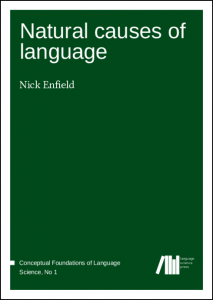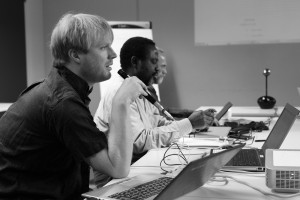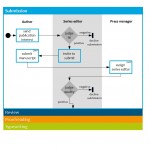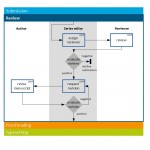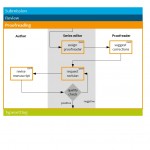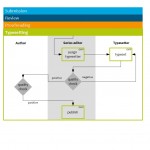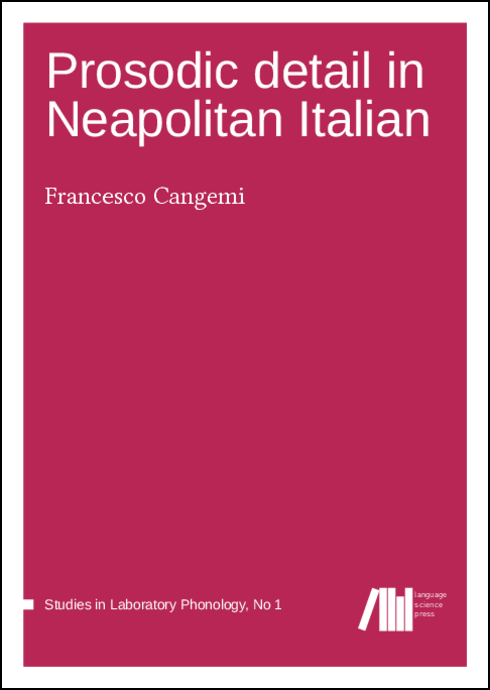While many of the things that we envisaged in the DFG proposal (Müller & Haspelmath 2013) are up and running already, one important thing is still missing: open reviewing. As was already argued by Pullum (1984), open review increases the quality of publications because reviewers will have to do their job carefully, as it is their reputation that will suffer if their name is associated with a bad publication. In addition, Pullum pointed out that reviews may improve a publication quite substantially and in a closed reviewing scenario the reviewers contribution cannot be acknowledged as it should be.
Screencast “How to submit a manuscript”
In order to make the submission of manuscripts easier for authors, we have created a screencast.
You can also find the screencast on our website. More screencasts will follow soon. They will explain the general workflow within Language Science Press; the review process; LaTeX editing; etc. If you have particular wishes or other ideas, let us know in the comments.
Language Science Press Meeting at DGfS Annual Conference Leipzig
Time: 2015 March 3, 14:00h
Place: Hörsaal 4 of Leipzig University’s Hörsaalgebäude https://conference.uni-leipzig.de/dgfs2015/index.php?id=20&L=1, very close to Gewandhaus and Augustusplatz in the city centre
Between March 4 and 6, several hundred linguists from many different countries will attend the Annual Conference of the DGfS (Deutsche Gesellschaft für Sprachwissenschaft) at Leipzig University. Many of them will be interested in open-access publication and Language Science Press’s publication model, and in fact quite a few are already editorial board members or supporters.
We are organizing a one-hour meeting on the day before the conference (March 3) to bring together colleagues who would like to get an update on LangSci’s activities and to discuss future developments with us. There is no need to register for this meeting – anyone can just drop by.
The Language Science Press meeting will be followed immediately by a more general panel discussion https://conference.uni-leipzig.de/dgfs2015/index.php?id=89&L=0 on the future of linguistics publication (at 15:30, also Hörsaal 4). Panelists are Martin Haspelmath (MPi-EVA Leipzig), Kai von Fintel (MIT), Alexander Bergs (U Osnabrück), Stefan Müller (FU Berlin), and Henriette Rösch (Leipzig University Library). The topic is the major changes in publication technology and practice that we are witnessing and what linguists should do to profit from the new opportunities.
Sebastian Nordhoff, Stefan Müller, Martin Haspelmath
New book: Natural causes of language by N. J. Enfield
Our series Conceptual Foundations of Language Science has published its first book. Listen to the author’s video below to know what it’s all about, or check out the series’ own blog at conceptualfoundations.org.
What causes a language to be the way it is? Some features are universal, some are inherited, others are borrowed, and yet others are internally innovated. But no matter where a bit of language is from, it will only exist if it has been diffused and kept in circulation through social interaction in the history of a community. This book makes the case that a proper understanding of the ontology of language systems has to be grounded in the causal mechanisms by which linguistic items are socially transmitted, in communicative contexts. A biased transmission model provides a basis for understanding why certain things and not others are likely to develop, spread, and stick in languages.
New manuscript guidelines
The new manuscript guidelines can be downloaded from here. They cover the creation and finalization of manuscripts with Latex. This document will be complemented by another one for the use of the OMP platform in the near future.
2nd series editors’ meeting in Berlin
The second series editors’ meeting took places in Berlin on Friday November 7.
After the last meeting in March the project has made good progress, and there are a number of decisions to be made. Unfortunately, due to various reasons, not all series could attend. Furthermore, a strike on the German railway network meant that Studies in Laboratory Phonology could also not be present. We made a virtue of necessity and tried a video conference in order to allow people who could not make it to attend nevertheless. We have now gained some experience with the setup now, and so future meetings will include this possibility right from the start, making general participation easier.
Top LangSci book gets nearly 350 downloads a month
Gallery
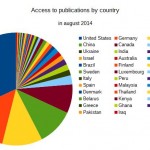
This gallery contains 4 photos.
We have done an analysis of our log files. The following statistics show how often complete books were downloaded in the months of August and September. October will follow later. Crawlers were excluded. Breakdown by books Joshua Wilbur’s “A grammar … Continue reading
Workflow 2.0
How do you publish books with Language Science Press? We have modeled our workflow in more detail. Prose guidelines will follow shortly. In the meantime, have a look at the flowchart. Anything unclear? Use the comment section to ask a question.
- Overview
- Submission
- Review
- Proofreading
- Typesetting
Series Editors’ Meeting 2014-2
The series editors’ meeting will take place November 7th 2014 from 9 am to 17 pm at the Free University.

